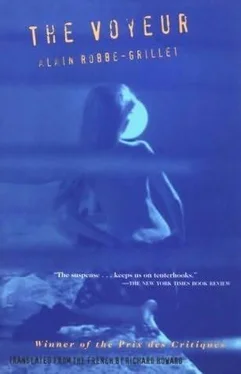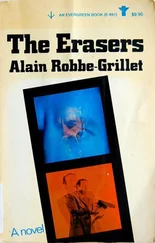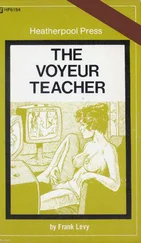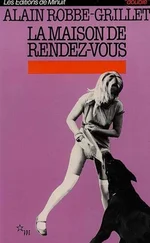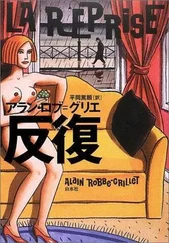In his room he immediately notices the suitcase is not under the table. But then he remembers having put it else-
where this morning. He opens the big cupboard—with his fingertips, since it has neither key nor handle—removes his suitcase, closes the cupboard again. This time he leaves the house by the door, and takes the main road to town. The raindrops have become so infrequent and so tiny that it requires particular attention to notice them at all.
Mathias enters the café “A l’Espérance,” puts the sandwiches, which aie wrapped in yellow paper, in the left pocket of his duffle coat, and continues toward the little square, walking on the cobbles washed clean by the rain, revealing all their colors.
The hardware shop¬window is empty: all the objects have been removed. Inside, a man in a gray jacket is standing on the display case, facing the street. His black felt slippers, his socks, and the bottoms of his trousers, raised by the movement of his arms, are exposed in broad daylight, about a yard above the ground. He is holding a big rag in each hand; the left hand is merely pressing against the glass, while the right is cleaning the surface with short, circular gestures.
As soon as he has walked around the shop corner, Mathias finds himself face to face with a young girl. He steps back to let her pass. But she stands where she is, staring at him as if she intended to speak to him, shifting her eyes several times from his suitcase to his face.
“Good morning, sir,” she says at last. “Aren’t you the watch salesman?”
It is Maria Leduc. She was just looking for Mathias; she was on the way to the house where he was staying, for she had heard he was still on the island. She wants to buy herself a watch—something sturdy.
Mathias decides it is no use to go back with her to her mother’s house—the last house as you leave town on the road to the big lighthouse—which would take him out of his way now. He points to the sidewalk surrounding the monu-
ment: now that the rain has stopped, that would be a good place to look at his merchandise. He sets down the suitcase on the damp stones and opens the clasp.
While lifting out the first strips of cardboard, which he piles one by one in the cover after having shown them to his customer, he mentions the fact that he missed her at Black Rocks, hoping she will voluntarily make some allusion to the tragic accident that has taken her little sister from her. But the girl shows no intention of discussing the subject, and he will have to lead into it more directly. She cuts Mathias’ polite formulas short, however, and confines herself to telling him the time of the funeral—Friday morning. Her words make it clear that the family prefers the simplest possible ceremony and the presence of only the closest relatives. It was as if they persisted in their bitterness toward the dead girl; she had no time to delay, she said, returning to the subject of the sale. In a few minutes she has made her choice and decided on the best way to conclude the transaction: the salesman is to leave the watch at the café where he takes his meals; for her part, she will leave the money there too. No sooner had Mathias closed his suitcase than Maria Leduc left.
On the other side of the monument he notices that the bulletin-board is covered with a completely white sheet of paper pasted on the surface of the wood. At this moment the garageman comes out of his tobacco shop carrying a little bottle and a fine brush. Mathias asks him what happened to the sign that was up the day before: it wasn’t the right one, the garageman answers, for the film they had sent along with it; the distributor had made an error in the shipment. He would have to announce next Sunday’s program by a hand-made ink inscription. Mathias leaves the man already busy with his task, firmly tracing a large letter O.
After taking the street to the left of the town hall, the salesman passes the end of the old harbor, completely empty at low tide—for the tide-gate there has not held in the water for years. Here too the mud has evidently been raked.
Next he follows the high wall of the fort. The road beyond returns to the coast, but without sloping down to the shore itself, and continues curving left, toward the point.
Mathias reaches the fork leading to the village of Saint-Sauveur much sooner than he expected—this was the last point he had systematically canvassed. He sold only one watch here—the last of the day—but since he has visited the principal residences, zealously and not over-hastily, it is futile to try his chances here once again.
Hence he sets out on the main road itself in the opposite direction, walking rapidly toward town.
After about fifty yards he comes upon an isolated cottage on his right, built at the edge of the road—which he had not bothered with on Tuesday because of its poverty-stricken aspect. Nevertheless, it is much like the other buildings on the island: a simple ground floor with two small square windows on each side of a low door.
He knocks on the door panel and waits, holding his suitcase in his left hand. The shiny finish, freshly repainted, imitates with remarkable accuracy the veins and irregularities of wood. At eye level are two round knots drawn side by side, so that they look like a pair of glasses. The salesman knocks again, this time with his ring.
He hears steps in the hallway. The door opens on a woman’s head—with no expression whatever—neither welcoming nor scowling, neither confident nor mistrustful, not even surprised.
“Good morning, madame,” he says. “Would you like to look at some splendid watches unlike any you’ve ever seen before, of ideal manufacture, guaranteed unbreakable, shock-proof, waterproof, and at prices that will surprise you? Just take a look at them! You’ll never regret the time—only a moment; it doesn’t commit you to a thing. Just take a look!”
“All right,” the woman says. “Come in.”
He makes his way down the hallway, then through the first door on the right into the kitchen. He sets down his suitcase on the big oval table in the middle of the room. The new oilcloth is decorated with a pattern of small many-colored flowers.
He opens the clasp by pressing on it with his fingertips. He seizes the cover in both hands—one on each side, thumbs over the reinforced corners with the copper rivets—and folds it back. The cover remains wide open, its outer edge resting on the oilcloth. The salesman takes the black memorandum book out of the suitcase with his right hand and puts it in the cover. Then he picks up the prospectuses and puts them on top of the memorandum book.
With his left hand he then takes hold of the first rectangular strip of cardboard by its lower left corner and holds it at the level of his chest, tilted at an angle of forty-five degrees, the two long sides parallel to the table top. Between the thumb and index finger of his right hand he takes hold of the protecting paper attached to the upper part of the cardboard strip; holding this paper by its lower right comer, he raises it, making it pivot on its hinge until it has made a rotation of more than one hundred eighty degrees. Then he lets go of this paper which, still fastened to the cardboard strip by one edge, continues its rotating movement until it occupies once again a vertical position next to the cardboard strip, although slightly askew because of the natural stiffness of the leaf. Meanwhile the right hand returns toward the salesman’s chest, that is, lowered to the level of the center of the cardboard strip, while moving toward the left. The thumb and index finger are extended forward, pressed together, while the other three fingers curve toward the interior of the palm. The end of the extended finger approaches the circle formed by the face of the watch attached to…
Читать дальше
